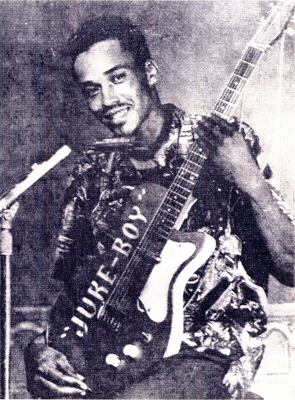If you want to hear fresh, timeless post-war blues that doesn’t remind you of Muddy or the other superstars, but is just representative, workaday blues with a magic that flows from its very “ordinariness", and which has all those qualities of snaky hiss and raw electricity without any of the tedious bragging or posturing “maleness" that is so often such a turn-off in the electric blues, you can’t do better than play yourself Juke Boy Bonner’s ‘Struggle Here In Houston’, made in 1968 and issued on an Arhoolie album called The Struggle. The YouTube posting of this track has disallowed embedding but the link is:
Bonner had started out virtually as a Jimmy Reed imitator, but in the long gap between his 1957-1960 sessions and his next visit to the studios, in 1967, he had found his own, beguilingly plain, sardonic style. Another of his albums rejoices in a title, taken from one of its songs, that is both splendid in itself and recurrently timely: Going Back To The Country Where They Don’t Burn The Buildings Down. Bonner lost the struggle there in Houston at the age of 47, in June 1978. To listen to his best records is to hear exactly the kind of rough guitar noises that Bob Dylan shows he loves by the sort of effort he makes with his own electric-guitar solos, which at best are triumphs of instinct over technique.
[Juke Boy Bonner: ‘Struggle Here In Houston’, Houston, 30/11 or 2/12/68; issued The Struggle, Arhoolie LP 1045, El Cerrito California, nd.; CD-reissued on Life Gave Me A Dirty Deal, Arhoolie CD 375, El Cerrito, nd.. Going Back To The Country Where They Don’t Burn The Buildings Down, Houston, 20/12/67 and 23/1/68, Arhoolie LP 1036, El Cerrito, nd.. Photo c/o Stefan Wirz, from his amazing website http://www.wirz.de/music/american.htm]


"tedious bragging or posturing “maleness" that is so often such a turn-off "
ReplyDeleteHi Michael
If you deny me singing along with Muddy Waters, "mannish boy" or "hoochie coochie" man with as much priapic posturing as I can muster these days ( not inconsiderable).
What is left for a poor boy to do?
Hi Joe
ReplyDeleteGood to hear from you.
Play air guitar in front of the mirror?
Thanks for posting this. Terrific.
ReplyDelete'Snaky hiss' indeed...
Dylan must be a big fan of Bonner.
ReplyDeleteThelma and Louise made a giant detour to avoid the place when they were on the run
"If you ever go to Houston
Better walk right
Keep your hands in your pockets
And your gun-belt tight
You'll be asking for trouble
If you're lookin' for a fight
If you ever go to Houston
Boy, you better walk right"
Michael
ReplyDeleteI’ve now listened to a few more songs from Juke Boy Bonner and liked them all, so I’m going to get a CD. I don’t mind choosing something at random, but if you know his stuff well perhaps you could recommend one (or more).
On a different topic, Elmer Gantry’s recent post about the provenance of Dylan’s Buckets of Rain was interesting.
Hi Gordon
ReplyDeleteAbout the provenance of Dylan's Buckets of Rain - ie that the melody has been taken from that tiresome song by the charisma-free Tom Paxton (and which many other singers seem to feel is a traditional song): really - it’s only the doodly-up, doodly-down bit at the beginning of each verse that is the same (it is exactly the same). Bob takes only this smallish portion of the tune: and then what he creates is so infinitely more thoughtful, creative and substantial than the one he's taken off from. It makes the resemblance interesting but any comparison unreasonable.
The proof is, to repeat the link, at http://www.youtube.com/watch?v=RKk0Nf5n1BM
Indeed.
ReplyDeleteI meant interesting only insofar as I had no idea at all that the guitar riff – which is such a prominent feature of Dylan’s song – had come from anywhere else. Thereafter, of course, the comparison ends. On the one hand a witless and charmless ho-ho drinking song; on the other, well...
It’s one of the many (the very many) marvels of Blood on the Tracks that, having scaled such vertiginous heights, Dylan should take his leave of the album with a comparatively quiet, almost half-spoken song. Yet while Buckets of Rain may not be one of the album’s ‘big’ tracks, it’s emotionally, intellectually and vocally as masterful, and as unflinchingly clear-sighted, as anything that precedes it.